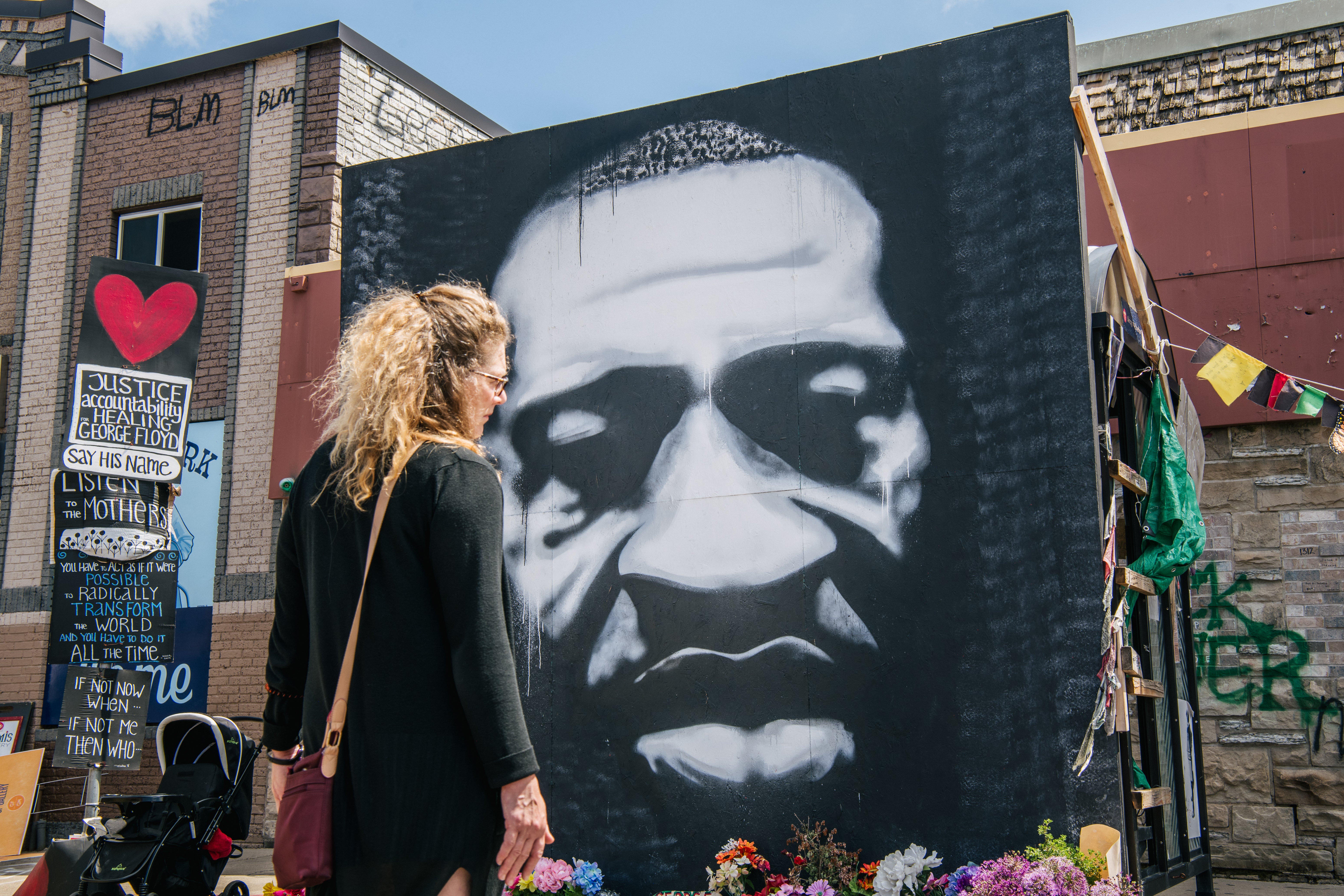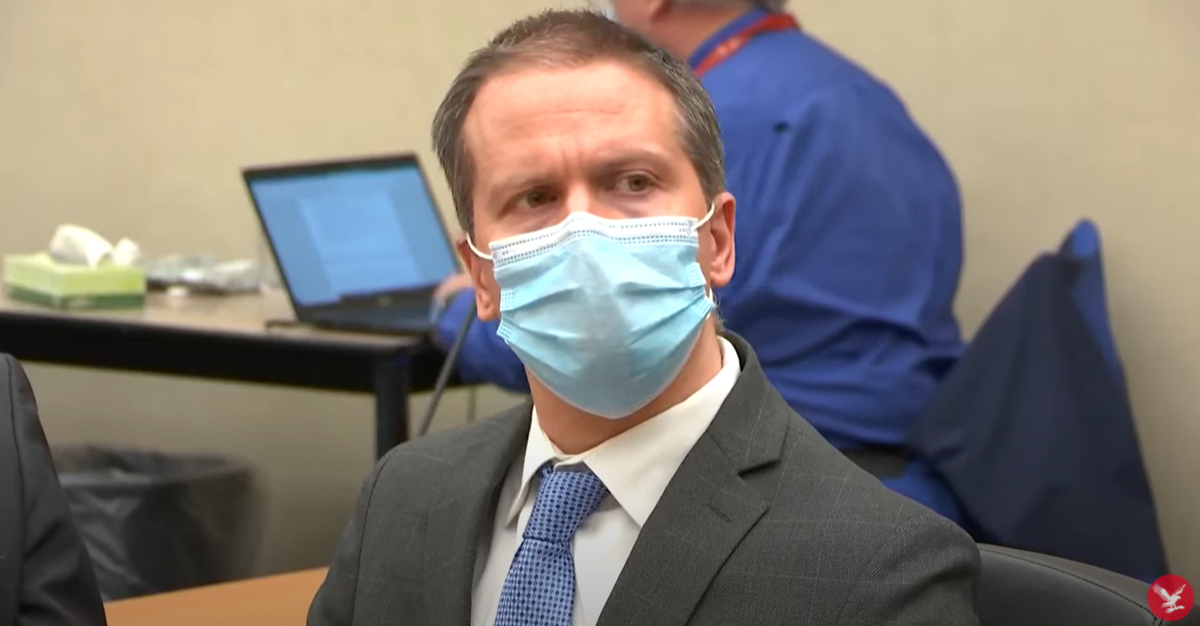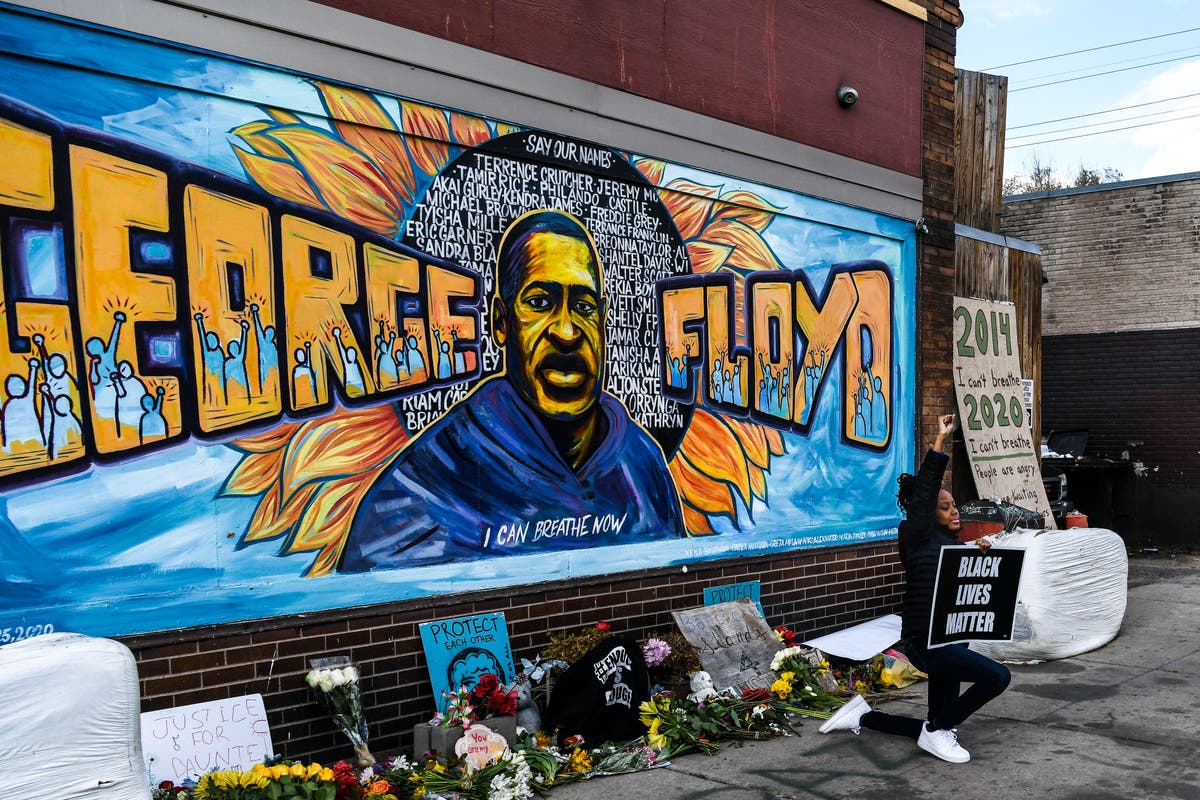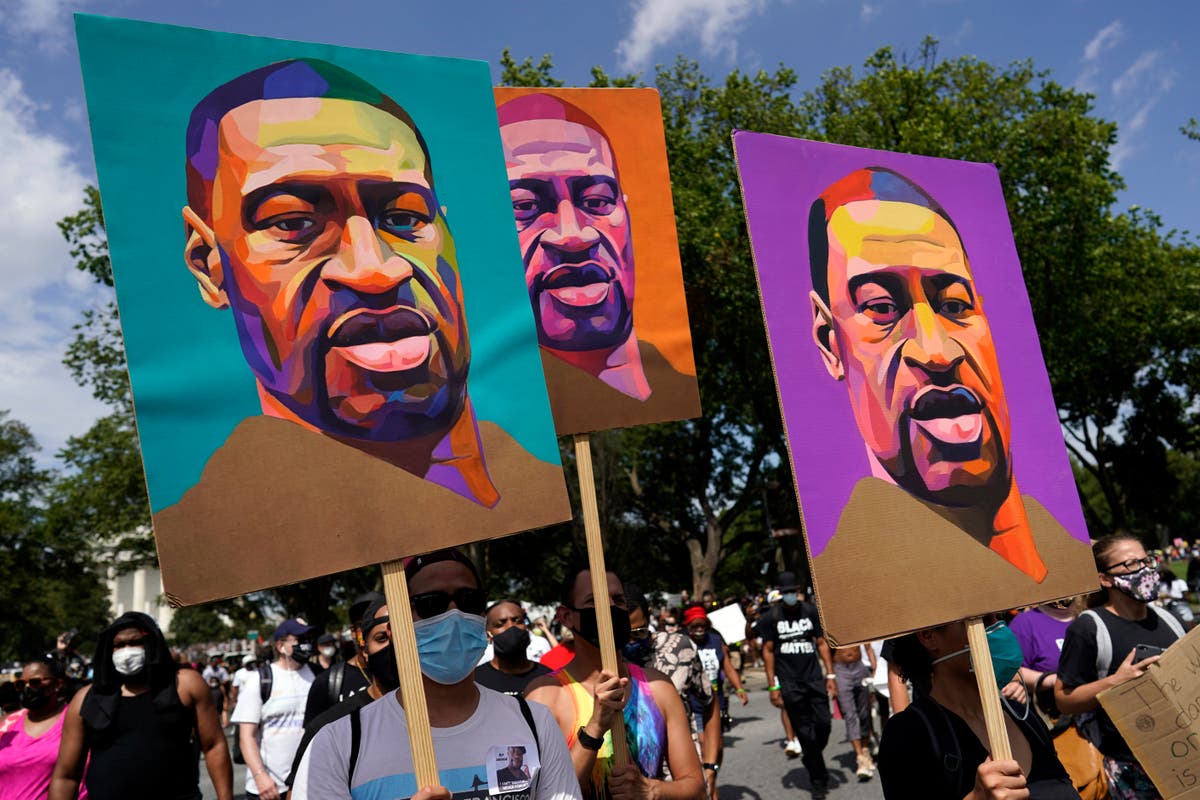George Floyd anniversary: Joe Biden meets family as US embassies fly Black Lives Matter flag
Follow here for the latest developments

The family of George Floyd, whose murder sparked protests around the world, met president Joe Biden at the White House for almost an hour to mark the anniversary of his death.
“If you can make federal laws to protect the bird which is the bald eagle, then you can make federal laws to protect people of colour,” George Floyd’s brother, Philonise, told reporters after the meeting.
It comes as the US president missed the George Floyd Justice in Policing Act deadline, which he originally set for 25 May. To mark the anniversary, embassies around the country were authorized by the State Department to fly the Black Lives Matter flag “advance racial equity and access to justice on May 25 and beyond”.
Mr Floyd was killed by Minneapolis police officer Derek Chauvin, who knelt on Mr Floyd’s neck for more than nine minutes. A jury of 12 found Chauvin guilty on three counts; one count of second-degree murder, one count of third-degree murder, and one count of manslaughter.
The former police officer has not yet been sentenced but faces up to 40 years in prison. The state attorney general, Keith Ellison, has requested the judge consider ‘aggravating factors’ when handing out a sentence, which requests “an upward sentencing departure”.
Following the murder of Mr Floyd, protests broke out in the state, across the nation, and internationally, as thousands of people took to the streets to decry police brutality.
Mr Floyd’s family is marking a year since his death with a series of events, including the Saturday rally held alongside other victims of police killings, a day of action, and a candlelit vigil on Tuesday, 25 May – a year to the day he was killed.
When and how will Derek Chauvin be sentenced for the murder of George Floyd?
While attorneys for Derek Chauvin will have to notify the trial court within 60 days if they plan to appeal, the court has already scheduled sentencing for the three charges he was found guilty on 16 June at 1.30pm local time.
In Minnesota, the state wherein Floyd died and Chauvin has been on trial for his death, second-degree murder carries a maximum sentence of 40 years in prison. Third-degree can see someone have 25 years in prison, and Second-degree manslaughter is punishable by up to 10 years in prison.
Theoretically, these charges could see Chauvin get 75 years in prison. However, state law dictates that the convicted is sentenced only to the most severe count against them - in this case, that would be a maximum of 40-years for second-degree murder. . In this instance, Judge Cahill could opt to ignore state law, but this would be unusual.
Bethany Dawson reports.

Derek Chauvin: how has he been charged and when will he be sentenced?
The 45 year old could spend a maximum of 75 years in prison
Derek Chauvin: What charges was he found guilty of and what do they mean?
After just one day of deliberation on the verdict, the 12-member jury in Minnesota found Chauvin guilty of second-degree murder, third-degree murder, and second-degree manslaughter. All those three different charges have slightly different meanings, writes Bethany Dawson.
In Minnesota, second-degree murder is defined as a killing that was not premeditated, or is caused by reckless conduct without obvious concern for human life.
Third-degree murder is known as a “depraved-heart murder”, that is caused without intent to kill but is inherently dangerous and thus conducted without consideration for human life.
The final charge that Chauvin has been found guilty of is second-degree manslaughter, which occurs when a person continues an act that they know is reckless, despite potentially fatal risks. A manslaughter charge, however, comes when there is no intention to take a life.
What’s next for ‘George Floyd Square’ in Minneapolis?
In a wide-ranging interview with Associated Press this week, mayor Jacob Frey touched on what was next for the block where George Floyd was killed that has since been dubbed “George Floyd Square”.
Local activists acting as unofficial custodians of the square have a “list of demands” before allowing the city to reopen the intersection, according to AP.
Frey said told the outlet the square would remain focused on racial justice and healing with long-term plans to memorialize Floyd at the site. He said the city would invest in black-owned businesses while also providing services to an area harmed by gun violence.
“This is a beautifully diverse community. ... It’s a community that deserves to feel safe,” he said, adding that there would be a phased reopening that would be a “safe and peaceful reconnection”.
‘Two steps forward, one step back’: How movement sparked by George Floyd’s murder has changed Britain
George Floyd’s murder at the hands of a police officer in Minneapolis sparked a movement not just in the US but around the world, bringing forth a global reckoning around race.
In Britain, demonstrators mobilised and took to the streets not just in solidarity but in protest at frustration with racism and policing in the UK. They carried placards with messages such as “The UK is not innocent”, taking aim at slaver statues and colonial relics. Hundreds of petitions urged institutions to tackle systemic inequalities, from the national curriculum to the black maternal mortality rate.
Now, one year on, how much progress has been made?
Nadine White reports:

How movement sparked by George Floyd’s murder has changed Britain
Special Report: The killing of a black man in America led to a wave of protest around the world, and the UK was no different. But 12 months on, have we seen lasting change? Nadine White talks to campaigners, activists and experts about how much progress has really been made in the past year
George Floyd anniversary: The death toll that shows little has changed since his murder shocked the world
It was when people said this needs to stop. It was when millions of Americans marched to say no more.
It was a defiant insistence that what had become business as usual – the routine killing by police of unarmed people of colour in what should be everyday interactions – was no longer acceptable.
And yet a year after the murder of 46-year-old George Floyd, the life literally squeezed out of him at a Minneapolis intersection by Derek Chauvin, as worried witnesses urged the officer to stop – and later millions watched around the world – the killings have not stopped.
Andrew Buncombe and Josh Marcus have more:

George Floyd anniversary: The death toll that shows little has changed since his murder shocked the world
One year ago George Floyd’s death shocked America. In the 12 months since little has changed
George Floyd ‘Ask Me Anything’ with Josh Marcus Tuesday evening 6pm BST
The Independent’s Josh Marcus, who covered the Chauvin trial will be avaliable to answer your questions about George Floyd, the legal case against his killer, and what comes next, from 6pm BST on Tuesday.
For more information see:

George Floyd anniversary ‘Ask Me Anything’: What happens to Derek Chauvin now?
On the one-year anniversary of George Floyd’s murder, Josh Marcus tackles your questions about the case, US policing and what comes next
Keir Starmer says next Labour government will eradicate structural racism
The leader of the Labour party, Keir Starmer, called eradicating structural racism in the next Labour government a “defining cause” on the anniversary of George Floyd’s death.
Other shadow cabinet ministers including David Lammy and Marsha De Cordova also promised to campaign to tackle racism.
Shadow justice secretary Mr Lammy said: “George Floyd looked like me, he could have been me. That’s why his death reverberated around the world. People said: none of us can breathe when we still face the issues of structural racism in our lives every day.
“That’s why George Floyd‘s death sparked a global movement, from Minneapolis to Manchester to Mile End. Black and white people came together to say Black Lives Matter.”
Sir Keir highlighted how the coronavirus pandemic had also “brutally exposed” injustices in society.
“On the 25th of May 2020, not only did people see the violence on a street in Minneapolis but they could see the violence and destruction that structural racism was having on black communities in their own societies as a result of the pandemic,” Sir Keir said.
A Labour government would introduce a race equality act in an attempt to address inequalities and injustices that have been exposed by the Covid pandemic.
“The eradication of structural racism will be a defining cause for the next Labour government,” Sir Keir said.
Ms De Cordova said a Labour administration would introduce a new curriculum to allow young people “a balanced understanding of Britain’s past and how it has shaped society today.”
Additional reporting by PA
Half of Black Britons ‘don’t think UK has progressed on race since George Floyd murder’
Half of Black people in Britain (49 per cent) think race relations have stayed the same since George Floyd’s murder last year which sparked a resurgence in Black Lives Matter protests, an exclusive YouGov poll suggests.
The survey indicated that some 42 per cent of all ethnic minority groups are of this opinion and 45 per cent of respondents to a national representative survey, of predominantly white people, held this view.
The vast majority of Black respondents (91 per cent) who believe there have been improvements in race relations in the past 12 months said it had quicker than it previously had.
Nadine White reports:

Half of Black Britons say no progress on race since George Floyd
Exclusive: YouGov poll comes as activists tell The Independent that racial equality in UK has worsened in past year.
One year on from George Floyd’s murder, can the Instagram infographics really save us?
Last summer, as seismic protests erupted across the world following the murder of George Floyd in Minneapolis, anti-racism flooded our social media feeds. Previously the domain of beach holidays, influencer sponcon and avocado brunches, suddenly, our screens were populated by sleek, 10-part PowerPoint-style slideshows on everything from defunding the police, to deaths in police custody, or how to be a better ally.
These graphics included data, quick facts, historical context, calls to action, then a sea of black squares (the hashtag #blackoutTuesday now has over 20 million posts), or guidance pointing to what the average reader could do to support the Black Lives Matter movement. In some ways, watching the shift felt bizarre. As someone who has been writing about anti-racism for years, I noticed that even people who I’d rarely seen post or engage with the issue of race, were willing to share these bitesize resources.
Micha Frazer-Carroll explains more:

Can the Instagram infographics save us?
As we mark the first anniversary of George Floyd’s death, Micha Frazer-Carroll asks whether social media squares can ever help change behaviour and fix political injustice or are always just performative posting
Calls to review UK police ‘stop-and-search’
UK campaigners are urging a crackdown on stop-and-search powers in the UK, one year on from the death of George Floyd in the US.
Currently in the UK police are able to search people and vehicles for drugs and or weapons without a warrant.
The killing of the African American Mr Floyd by a white police officer restarted the debate on the use of stop and search by the British police, over concerns that those from black and ethnic minority backgrounds tend to be disproportionately targeted.
Campaigners are now concerned that further sweeping powers have been proposed in the Police, Crime, Sentencing and Courts Bill. These would allow police to stop and search those who have previously been convicted of carrying a knife, even if there was no reasonable suspicion.
Rachel Harger, a solicitor, explained to PA: “Under the new policing bill the police will be able to stop and search individuals, who have previously been convicted of carrying an offensive weapon (even if they have not received a custodial sentence), without reasonable suspicion.”
Meanwhile, Human rights group Justice said they felt that greater restrictions are needed on stop and search to “avoid discriminating against our country’s ethnic minorities.” The group added that the Bill would “extend punishment from prison into the community, and risk further damaging confidence in the police.”
Subscribe to Independent Premium to bookmark this article
Want to bookmark your favourite articles and stories to read or reference later? Start your Independent Premium subscription today.

Join our commenting forum
Join thought-provoking conversations, follow other Independent readers and see their replies
Comments